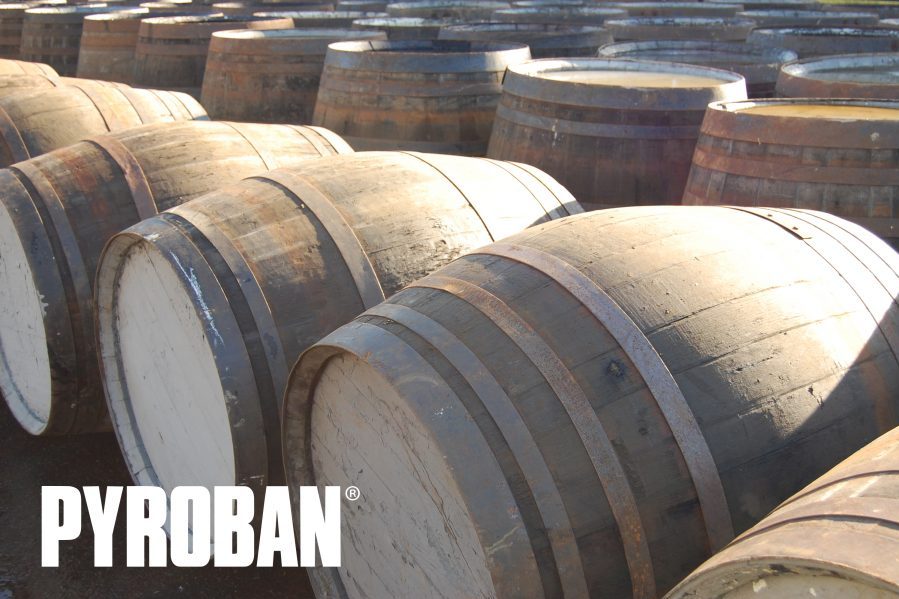Distilleries have been affected by the update to the EN1755:2015 standard, which has changed how ATEX compliant lift trucks are built and managed.
“The storage of high volumes of casks of maturing scotch whisky presents explosion risks classified in the same league as the petrochemical industry,” says Rob Vesty of safety company Pyroban®. “Due to the volume of high strength spirit, many sites are classed as top tier COMAH and have maturation warehouses that are classified as Zone 2 hazardous areas.”
During the ageing process, some of the whisky in each barrel evaporates through the oak. This is known as the “Angels’ Share” and is potentially explosive under the right conditions. Barrels are often stored for up to 20 years, each representing a large investment for the distiller.
“There are many different methods and types of lift trucks used to store and transport the barrels,” says Rob. “What appears to be a standard storage and picking operation is significantly affected by the overpowering whisky vapour. Any equipment working in these high capacity Zone 2 warehouses and blending areas, must be explosion protected and comply with ATEX 2014/34/EU so it cannot be the source of an ignition.”
In November 2017, EN1755:2015 superseded EN1755:2000, the standard which conversion companies such as Pyroban follow to comply with ATEX 2014/34/EU. The company has invested in a two-year change programme to meet these new requirements.
Pallet, stacker or reach trucks, VNA and any counterbalance trucks are affected. One of the key changes is that static, an ignition source, is now considered a “normal” occurrence in Zone 2 hazardous areas. Requirements for tyres, seats, arm rests, cabin sides, hydraulic systems, and more, have now changed.
“Pyroban’s ATEX conversions help to address the technical requirements of the EN1755:2015 updates, but distilleries will need to be aware of how this might affect their fleet day to day, as well as maintenance and parts supply,” he says.
Most distilleries specify Pyroban’s system6000™ which incorporates gas detection to continuously monitor the direct environment around the protected equipment, and automatically shuts down the equipment before dangerous levels are reached.
When a mixture of flammable gas or vapour in air is detected, system6000 gives an audible and visual warning at 10% Lower Explosive Limit (LEL) propane in air. At 25% LEL it shuts down the protected equipment, automatically eliminating the risk of an explosion.
Distilleries have the option of selecting the pellistor based or infrared gas sensing systems to suit their specific needs. Infrared technology has been increasingly popular at distilleries as it is suited for operations with single, or fewer, hazard types, in this case ethanol. system6000 auto-calibrates and self-tests the gas head at start up to ensure it is working correctly, but is set to have an increased level of safety.
EN1755 has led to changes to any device or controller carrying out a safety function, which includes the design of Pyroban’s system6000. The systems now need to fulfil the requirements of PLr=C in accordance with EN ISO 13849-1 or SIL 1, in accordance with EN61508-1.
Pyroban’s system6000 combines gas detection with various explosion protection methods such as restricted breathing enclosures, stainless steel cladding of forks and surface temperature cooling to ensure the engine, motors, brakes, electrics and other components remain below the auto-ignition temperatures of flammable materials.
The system complements the latest technologies seen in engine and battery electric truck design including energy performance and the ergonomics, and is suitable for all types of materials handling, and other, equipment.
“For instance, scrubber driers are used in the maturation warehouses to keep dust levels to a minimum, and access platforms are used for regular maintenance operations. These should be explosion protected too,” says Rob. “Many distilleries will also have their own Pyroban trained engineers that will need to update their training, and of course the annual safety audits are increasingly important.”
For more information, visit www.pyroban.com, call +44 (0)1273 456800 or email sales@pyroban.com .

